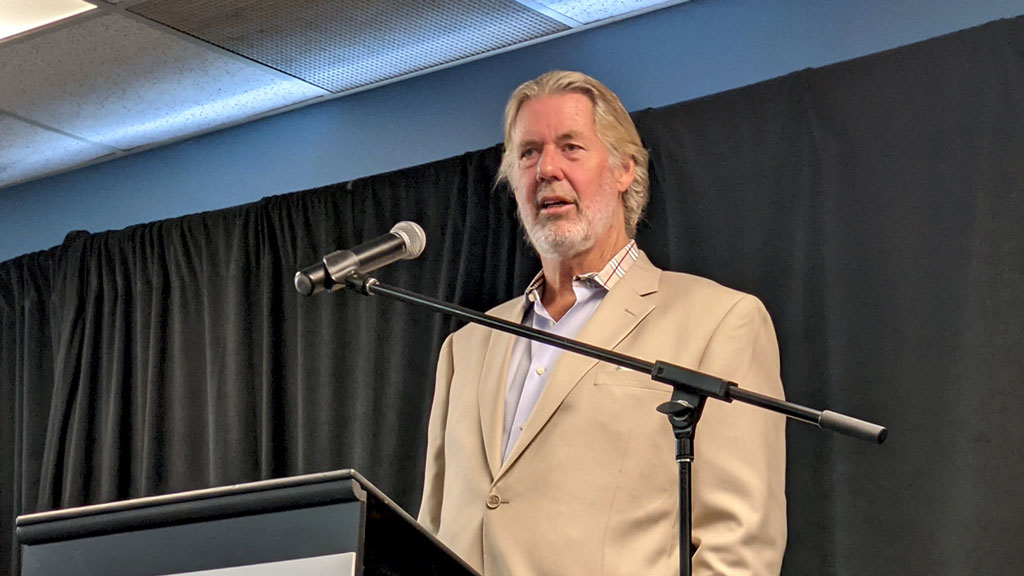Change is occurring rapidly and the construction industry needs to be prepared.
That was the message from Toronto Construction Association (TCA) president and CEO John Mollenhauer to the crowd at the association’s 27th annual Members’ Day held Sept. 14 at the TCA office in Richmond Hill, Ont.
“The bottom line is that economists and technology gurus describe this industrial revolution that we’re in as an exponential era, a year of change that is so rapid that nothing remains constant,” said Mollenhauer. “I think that will characterize our industry going forward. Things can change so quickly. We have to be nimble. We have to be flexible.
“We are going, for the foreseeable future, to need all of us to adjust quickly. We’re going to need to work more collaboratively with our contracts.”
There is no greater disruptor than a global pandemic, Mollenhauer added.
“I think we very quickly forget that there were a lot of things that were changing and changing rapidly before the pandemic began. Most of us were naïve enough to believe the pandemic would end and we would revert back to the old normal as abruptly as it started. I now strongly believe we will never see anything that remotely looks like the old normal and the new normal will be characterized by rapid change.”
He said the volatility with the supply chain is not going to go away anytime soon and collaborative approaches are increasingly being used to deal with the issues.
“As contractors, as project planners and now we’re becoming partners with our clients, not just GCs. The trades, the suppliers, we’re all partners. Projects are getting cancelled or deferred because you bid something and by the time you bid, those numbers have escalated and your clients are using numbers for their budgets that are long outdated. I think we’re going to see price volatility continue even though it will temper obviously.”
Going forward, those in the industry are going to have to look at supply chains completely differently, Mollenhauer explained.
“You’re going to have to track everything, look for domestic alternatives. What we’re seeing now is a lot of the buyers of construction recognizing you have to buy something now and store it because that just-in-time approach isn’t working.”
Escalation clauses are also becoming increasingly popular.
“You should not sign, in my opinion today, a lump sum contract or GMP (Guaranteed Maximum Price) without an escalation clause. If you have an escalation clause…they’re (the client) not going to agree to it unless there is a de-escalation clause,” said Mollenhauer. “Give your client an opportunity to save money if the number comes down. That’s absolutely necessary.”
Different approaches are needed in order to avoid projects being deferred or cancelled.
“Those that are around the industry are beginning to recognize we need to do these kinds of things in order to mitigate some of the risks,” said Mollehauer. “In the absence of collaborative approach to contracts…unless they are using real numbers and they are current, then they will inevitably find when they tender the project, first of all they won’t get as many bidders as they would like, and when they do they will find the number is too high. Instead of moving quickly when they ought to, they stall and so many of the projects right now are getting cancelled or deferred.”
Mollenhauer took the time to provide some context during his address. He pointed to some of the things that were going on in the world prior to March 2020 that had an impact on the construction industry: Trump’s protectionist policies, natural disasters, prompt payment, skilled workforce challenges, the slow adoption of technology and the lack of government investment in infrastructure.
“Anybody can forecast what the market might look like going forward,” said Mollenhauer. “The only way any of that’s going to make any sense to you is if you understand why things are the way they are today, in the here and now and how that might affect us when we’re talking about the future.”
Mollenhauer pointed out crisis is a trend accelerator so what was an issue pre-COVID is a bigger issue now and going forward.
“When we look at all these things that were happening pre-COVID and then add COVID in as a crisis and look at how that exacerbates things or changes trends that were already happening, it has the effect of accelerating the pace at which these trends take place and stay with us moving forward,” he said.











The trades are filled with 5th year apprentices who just work invisibly off and on. You want more great tradesmen to come back? accept those tradesmen as licensed red seal and you’ll get a major uptick in help. If not good luck attracting new workers with little manpower to help and train them. Lose a generation of workers good luck training the next. Pay up fellas and recognize the failure of red seal, college of trades organizations